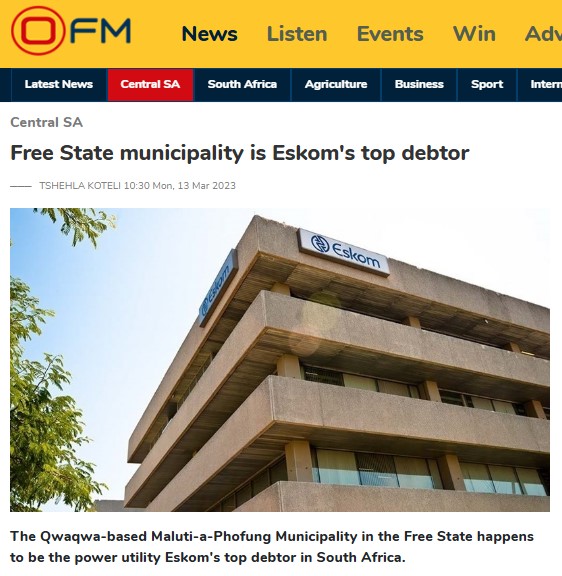Central SA
Illegal connections, municipal debt deepen Eskom’s crisis in Free State─── KEKELETSO MOSEBETSI 15:41 Mon, 17 Feb 2025

Illegal electricity connections at Free State municipalities remain one of the most pressing factors worsening Eskom’s growing debt crisis.
Speaking in the OR Tambo House in Bloemfontein on Monday (17/2), Electricity Minister Kgosientsho Ramakgopa outlined the severity of the situation and the government’s intervention plans.
Ramakgopa said municipalities nationwide collectively owe Eskom R100 billion. However, municipalities themselves are owed more than R380 billion by consumers, further straining Eskom’s finances. The problem is especially severe in the Free State, where municipalities owe Eskom R26 billion.
Solving this crisis requires more than just efforts by Eskom or municipalities, he said. It demands legislative action and cooperation between municipalities, provinces, and the national government. “Government must work hand in hand with provinces and municipalities.”
The immediate priority is bringing the most indebted municipalities into a structured process to reduce their financial burden. A major contributor to the crisis is illegal electricity connections, which significantly impact municipal debt.
“The extent of illegal connections is huge,” Ramakgopa said, adding that unauthorised power usage accounts for a substantial portion of municipalities’ outstanding debt to Eskom.
To address this, the government is rolling out smart meters, which will help municipalities manage and control electricity consumption more effectively. Implementation has already begun in Maluti-A-Phofung (MAP), one of the most financially unstable municipalities owing Eskom.
Rollout has dramatically improved MAP’s electricity collection rate, now exceeding 90%, Ramakgopa said. Given this success, the government plans to expand smart meter installations across the country.
Beyond accurate billing, smart meters will also help formalise previously illegal connections. Ramakgopa reiterated the government’s commitment to assisting struggling municipalities by refurbishing key infrastructure, such as transformers, to reduce load demand and improve efficiency.
Free electricity
He also highlighted challenges in implementing the government’s policy of providing 50kWh of free electricity per month to qualifying households. Many municipalities lack proper systems to distribute these benefits. Smart meters will allow the government to load the free electricity directly onto eligible households’ meters at the beginning of each month, ensuring they receive the support they need.
For households that can afford electricity but refuse to pay, credit control measures will be enforced. This approach aims to balance financial sustainability with support for vulnerable communities.
Additionally, in a bid to reduce reliance on Eskom and enhance municipal energy security, Ramakgopa announced that R4 billion per year will be allocated to help municipalities generate their own electricity, particularly through solar power initiatives.














